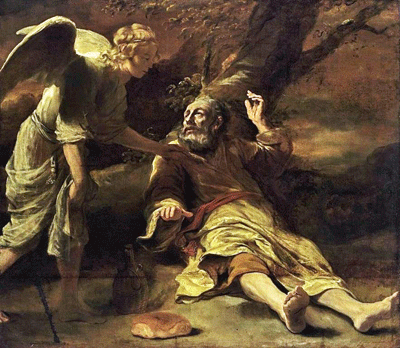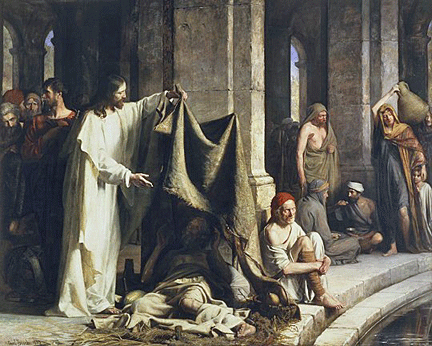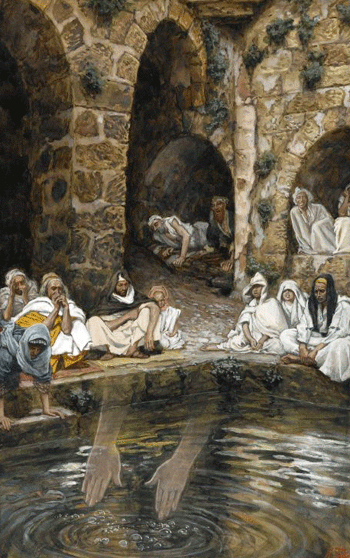

Elias is fed by an Angel before his fast of forty days.
The fast on the Wednesday after the First Sunday of Lent is prescribed by a double law—it is Lent, and it is Ember Wednesday. It is the same with the Friday and Saturday of this week. There are two principal objects for the Ember Days of this period of the year: the first is to offer to God the season of Spring, and, by fasting and prayer, to draw down His blessing upon it; the second is to ask Him to enrich with His choicest graces the priests and sacred ministers who are to receive their Ordination on Saturday. Let us, therefore, have a great respect for these three days; and let those who violate upon them the laws of fast or abstinence, know that they commit a twofold sin.
Up to the 11th century the Ember Days of Spring were kept in the first week of March; and those of Summer, in the second week of June. It was Pope St. Gregory VII who fixed them as we now have them; that is, the Ember Days of Spring in the first full week of Lent, and those of Summer during the Octave of Pentecost.
On all the Ember Wednesdays there are read, in place of the Epistle at Mass, two Lessons from Sacred Scripture. Today the Church brings before us the two great types of Lent—Moses in the first Lesson and Elias in the second—in order to impress us with an idea of the importance of this forty days' fast, which Christ Himself solemnly consecrated when He observed it, thus fulfilling, in His own Person, what the Law and the Prophets had but prefigured.
Moses and Elias fasted for forty days and forty nights, because God bade them come near to Him. Man must purify himself, he must unburden himself, in some measure at least, of the body which weighs him down, if he would enter into communication with Him, Who is the Holy Spirit. And yet the vision of God granted to these two holy personages was very imperfect: they felt that God was near them, but they beheld not His glory. But when the fullness of time came (Gal. 4: 4), God manifested Himself in the flesh: and man saw and heard and touched Him (1 John 1: 1). We indeed are not of the number of those favored ones who lived with Jesus, the Word of Life; but in the Holy Eucharist He allows us to do more than see Him—He enters into our breasts, He is our Food. The humblest member of the Church possesses God more fully then either Moses on Sinai or Elias on Horeb. We cannot, therefore, be surprised that the Church, in order to fit us for this favor at the Easter solemnity, bids us go through a preparation of forty days, though its severity is not to be compared with the rigid fast which Moses and Elias had to observe as the condition of receiving what God promised them.
On Ember Friday we are reminded of the ancient Lenten discipline of the Church. We would frequently be at a loss to understand Her liturgy of this season, unless we picture Her to ourselves as preparing the public penitents for a renewed participation in the Sacred Mysteries. But first they must be reconciled to God, Whom they have offended. Their soul is dead by sin; can it be restored to life? Yes; we have God’s word for it. The Lesson from the prophet Ezechiel, which the Church began yesterday for the catechumens, is continued today for the benefit of the public penitents. If the wicked do penance for all his sins, which he hath committed, and keep all My commandments, and do judgment and justice; living he shall live, and shall not die. But his iniquities are upon him and rise up against him, crying to Heaven for eternal vengeance! And yet God, Who knows all things, and forgets nothing, assures us that He will not remember iniquities which have been redeemed by penance. Such is the affection of His Fatherly Heart, that He will forget the outrage offered Him by His child, if this child will but return to its duty. Thus then the penitents are to be reconciled; and on the Feast of the Resurrection they will be associated with the just, because God will have forgotten their iniquities; they themselves will be just men. Thus it is that the Liturgy, which never changes in its essentials, brings frequently before us the ancient discipline of public penance.
Nowadays, sinners are not visibly separated from the faithful; the Church doors are not closed against them; they frequently stand near the holy altar, in the company of the just; and when God’s pardon descends upon them, the faithful are not made cognizant of the grace by any special and solemn rite. Let us here admire the wonderful mercy of our Heavenly Father, and profit by the indulgent discipline of our Holy Mother the Church. The lost sheep may enter the fold at any hour and without any display; let him take advantage of the condescension thus shown him, and never more wander from the Shepherd, Who thus mercifully receives him. Neither let the just man be puffed up with self-complacency, by preferring himself to the lost sheep; let him rather reflect on those words of today’s lesson: If the just man turn himself away from his justice, and do iniquity... the justices which he hath done shall not be remembered. Let us, therefore tremble for ourselves, and have compassion on sinners. One of the great means on which the Church rests Her hopes for the reconciliation of sinners is the fervent prayers offered up for them by the faithful during Lent.
 The Gospel of today tells of the cure of the infirm man who had waited 38 years at the Probatica pool—a figure of the
Sacrament of Penance. How was his cure wrought? First of all, the infirm man says to Jesus: I have no man, when the water is troubled,
to put me into the pond. The water would have cured him; but observe, he has need of some Man to lead him to the water.
This Man is the Son of God, and He became Man in order to heal us. As Man, He has received power to forgive sins,
and before leaving this earth, He gave that same power to other men, and said to them: Whose sins ye shall forgive, they are forgiven them
(John 20: 23). The penitents, then, are to be reconciled with God by virtue of this supernatural power; and the infirm man,
who takes up his bed and walks, is a figure of the sinner, whose sins have been forgiven him by the Church, by the divine power of the keys.
The Gospel of today tells of the cure of the infirm man who had waited 38 years at the Probatica pool—a figure of the
Sacrament of Penance. How was his cure wrought? First of all, the infirm man says to Jesus: I have no man, when the water is troubled,
to put me into the pond. The water would have cured him; but observe, he has need of some Man to lead him to the water.
This Man is the Son of God, and He became Man in order to heal us. As Man, He has received power to forgive sins,
and before leaving this earth, He gave that same power to other men, and said to them: Whose sins ye shall forgive, they are forgiven them
(John 20: 23). The penitents, then, are to be reconciled with God by virtue of this supernatural power; and the infirm man,
who takes up his bed and walks, is a figure of the sinner, whose sins have been forgiven him by the Church, by the divine power of the keys.
In the third century, a heretic named Novatian taught that the Church has not the power to forgive sins committed after Baptism. This doctrine was condemned by the Councils and the holy Doctors of the Church; and in order to offer to the faithful some outward expression of the power given to the Son of Man of forgiving sins to such as repent, there was painted on the walls of the places where the Christians used to assemble, the infirm man of the Gospel, walking with his bed upon his shoulders. This consoling symbol is frequently met with in the frescoes which were painted, even in the age of the Martyrs, in the Roman catacombs. They show us how the early Christians were taught to understand this passage of the Gospel, which the Church, so many centuries ago, assigned to this day.
The Water of the Probatica was also a symbol; and here the Gospel conveyed a special instruction to the Catechumens. It was by Water that they were to be made whole, and by Water endowed with a supernatural virtue. The miraculous pond of Jerusalem could only cure the body, and that at rare intervals, and the favor could only be conferred upon a single individual; but now that the Angel of the Great Counsel has come down from Heaven and sanctified the waters of the Jordan, the Probatica is everywhere—it is giving health to the souls of man without any limitation either of time or number. Man is the minister of this grace; but it is the Son of God, become the Son of Man, that works by the human minister.
 Let us also consider the multitude of sick, who, as the Gospel tells us, were waiting for the moving of the water.
They represent the various classes of sinners, who are seeking, during this holy time, to be converted to their God.
There are the Sick, or as the Latin word has it, the Languid—these are the torpid, who never thoroughly give up their evil habits;
there are the Blind—these are they whose spiritual eye is dead; there are the Lame—who limp and falter in the path to salvation;
and lastly there are the Withered—who seem incapable of doing a single good action. All are waiting for the favorable moment.
Jesus will soon be with them, and will say to each of them: Wilt thou be made whole? Let them answer this question with love and confidence,
and they will be healed.
Let us also consider the multitude of sick, who, as the Gospel tells us, were waiting for the moving of the water.
They represent the various classes of sinners, who are seeking, during this holy time, to be converted to their God.
There are the Sick, or as the Latin word has it, the Languid—these are the torpid, who never thoroughly give up their evil habits;
there are the Blind—these are they whose spiritual eye is dead; there are the Lame—who limp and falter in the path to salvation;
and lastly there are the Withered—who seem incapable of doing a single good action. All are waiting for the favorable moment.
Jesus will soon be with them, and will say to each of them: Wilt thou be made whole? Let them answer this question with love and confidence,
and they will be healed.
The Station for every Ember Saturday is, as we have seen, in the Basilica of St. Peter—the Vatican—where the people were wont to assemble toward evening, that they might be present at the Ordination of the Priests and Sacred Ministers. This day was called Twelve-Lesson-Saturday, because, formerly, twelve passages from Holy Scripture used to be read. (The number now is seven—five Lessons, the Epistle and the Gospel.) The Mass during which the Ordinations were given, was celebrated during the night; so that by the time it was over, the Sunday had begun. Later on the Ordination Mass was celebrated early on Saturday, but, in memory of the ancient practice, the Gospel for Saturday is repeated on Sunday—in this case, the Gospel of the Transfiguration. The following is the interpretation given by the ancient Liturgists, among whom we may especially mention the learned Abbot Rupert:
"The Church would have us think upon the sublime dignity which has been conferred upon the newly ordained Priests. They are represented by the three Apostles, who were taken by Jesus to the high mountain, and favored with the sight of His glory. The rest of the Disciples were left below: Sts. Peter, James and John were the only ones permitted to ascend Tabor; and they, when the time should come, were to tell their fellow Apostles, and the whole world, how they had seen the glory of their Master and heard the words of the Father declaring the Divinity of the Son of Man. This voice, says St. Peter, coming down to Him from the excellent glory: This is My Beloved Son, in Whom I am well pleased; hear ye Him. And this voice we heard, brought from Heaven, when we were with Him on the holy mount (2 Peter 1: 17, 18). In like manner, these priests who have just been ordained, and for whom you have been offering up your prayers and fasts, will enter into the cloud with the Lord. They will offer up the Sacrifice of your salvation in the silence of the sacred Canon. God will descend into their hands, for your sake; and though they are mortal and sinners, yet will they, each day, be in closest communication with the Divinity. The forgiveness of your sins, which you are now preparing to receive from your heavenly Father, is to come to you through their hands; their superhuman power will bring it down from Heaven upon your souls. It is thus that God has cured our pride. The serpent said to us through our first parents: Eat of this fruit, and you shall be as gods. We unfortunately believed the tempter, and the fruit of our transgression was death. God took pity on us, and resolved to save us; but it is by the hands of men that He would save us, and this in order to humble our haughtiness. His own eternal Son became Man, and He left other men after Him, to whom He said: As the Father has sent Me, I also send you (John 20: 21). Let us, then, show honor to these men, who have, this very day, been raised to so high a dignity. One of the duties imposed on us by our holy religion is respect to the Priesthood."
Contact us: smr@salvemariaregina.info
Visit also: www.marienfried.com